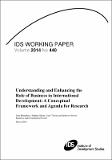Understanding and Enhancing the Role of Business in International Development: A Conceptual Framework and Agenda for Research

Download
Date
2014-03-07Author
Humphrey, John
Spratt, Stephen
Thorpe, Jodie
Henson, Spencer
Metadata
Show full item recordImpact
Abstract
It is now commonplace for development policy makers to refer to the contributions of businesses to the achievement of development goals and the importance of collaborations between businesses and development agencies. Many businesses give greater attention to the development impacts of their activities. There has been relatively little systematic and critical thinking about where and how businesses can contribute most effectively to the achievement of development objectives and, accordingly, how development agents should prioritise and focus their collaborations with businesses.
This paper initiates such a systematic and critical approach, starting from the question ‘How can development policy work with and on businesses and the business environment so that the private goals of businesses contribute to most effectively to public development objectives?’ It identifies three basic categories of business and development initiatives: increasing the overall level of business activity, addressing sustainability challenges and promoting business activities that are particular benefit to the poor. The paper considers three major challenges for maximising the contributions businesses to the achievement of development goals. The first is increasing the alignments between business and objectives and development objectives, and the paper considers both the different ways this can be achieved and when such alignments are overly difficult to achieve.
The second is to prioritise interventions. When resources are scarce, it is essential to pursue interventions that have the biggest development impact. This implies choosing interventions with goals and approaches that are most likely to be successful; in so doing, examining issues of feasibility, effectiveness and efficiency. So that scarce resources are focused on the areas of greatest benefit. The third is to achieve scaling up and systemic change. There are many examples of business activities that have positive development impacts but which are being pursued at small-scale and/or in quite specific geographical or sectoral contexts. How can such initiatives be up-scaled, translated and/or replicated in order to enhance impacts on the poor in ways that endure beyond the specific interventions applied?
Is part of series
IDS Working Paper;440Rights holder
Institute of Development StudiesCollections
- IDS Research [1671]
